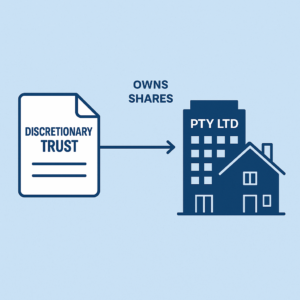SPV (Special Purpose Vehicle) Business Structure in Australia
A Special Purpose Vehicle (SPV) is a separate legal entity created for a specific, limited business purpose — usually to isolate financial risk, hold assets, or manage a particular project or investment.
In Australia, SPVs are commonly structured as companies or trusts and are widely used in property development, investment projects, joint ventures, and asset financing.
By separating the SPV from the parent company or individual owners, financial exposure is limited to the assets and liabilities within that entity — protecting other business interests.
How an SPV Works
An SPV is typically created to own, manage, or finance a single project or set of assets.
It operates independently from its founders or investors, even if they control it indirectly.
For example:
-
A property developer might set up a new SPV company for each project.
-
Investors might pool funds into an SPV trust for a single investment.
-
A holding company might create an SPV to isolate a high-risk venture or asset.
Once the purpose of the SPV is complete (for example, when the project is sold or finished), the entity can be wound up.
Common Uses of SPVs in Australia
-
Property Development: Each project is owned by its own SPV to ring-fence risk and financing.
-
Investment Structures: Used to hold a single asset or investment portfolio.
-
Joint Ventures: Partners can invest in a neutral vehicle with defined ownership and liability.
-
Asset Protection: Keeps high-risk or high-value assets separate from the main business.
-
Securitisation & Financing: Used in structured finance to isolate specific financial exposures.
Advantages
✅ Risk Isolation
Liabilities are contained within the SPV, protecting parent companies or investors from financial fallout.
✅ Asset Protection
Segregates valuable or high-risk assets from the main business group.
✅ Investor Confidence
Clearly defines ownership, rights, and responsibilities for investors or lenders.
✅ Tax & Regulatory Flexibility
Can be structured as a company or trust, depending on the project’s goals and tax requirements.
✅ Simplified Project Management
Each SPV focuses on one project, keeping accounting and legal matters clear and independent.
Disadvantages
⚠️ Setup and Ongoing Costs
Creating and maintaining an SPV involves registration, accounting, and legal expenses.
⚠️ Limited Purpose
SPVs cannot operate beyond their defined business purpose without legal or tax implications.
⚠️ Complex Compliance
Requires careful management to ensure the SPV remains legally separate and compliant.
⚠️ Financing Limitations
SPVs without strong backing may find it harder to secure credit or funding.
⚠️ Winding Up Requirements
When the project ends, the SPV must be properly deregistered or liquidated.
When an SPV Is Suitable
An SPV is ideal when you need:
-
To isolate risk for a specific project or investment.
-
To manage joint venture ownership between multiple parties.
-
To hold property or assets separately for accounting or financing purposes.
-
To manage structured finance or securitisation transactions.
-
To protect parent entities from exposure to operational or financial risks.
SPVs are commonly used by property developers, investment groups, and fund managers.
Key Obligations
To establish and operate an SPV in Australia:
-
Choose the structure (usually a company or trust).
-
Register with ASIC (if a company) and obtain an ACN and ABN.
-
Prepare a trust deed (if a trust structure is used).
-
Appoint directors or trustees.
-
Maintain financial statements and lodge annual tax returns.
-
Register for GST if required.
-
Ensure ongoing compliance with ASIC and ATO obligations.
Trustify Tip: Always define the SPV’s purpose clearly in the founding documents — vague or broad purposes can cause compliance issues and affect tax treatment.
Summary
An SPV (Special Purpose Vehicle) is a strategic structure used to isolate risk, protect assets, and manage specific projects or investments.
It offers control, flexibility, and protection — but must be set up and managed carefully to remain compliant and effective.
Whether structured as a company or trust, an SPV can be an essential tool for developers, investors, and business owners seeking to manage financial exposure in Australia.
Information current as of October 2025. Reviewed by the Trustify Business Advisory Team. General information only — not financial or legal advice.
Others
-
October 20, 2025 Buying Property Under Your Personal Name in Australia: Pros and Cons
-
October 18, 2025 Service Trust Business Structure in Australia




